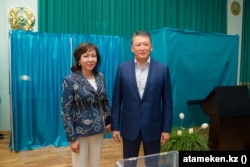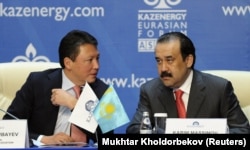"All oligarchs are equal, but some are more equal than others." Why is Timur Kulibaev getting richer despite losing assets?
January 2020. President Kassym-Jomart Tokayev meets with Timur Kulibayev, the chairman of the presidium of the National Chamber of Entrepreneurs "Atameken." The agenda includes issues of import substitution, improving the efficiency of government procurement, and business development. At that time, Kulibayev, the husband of the middle daughter of former president Nursultan Nazarbayev, was a magnate and one of the most influential figures in Kazakhstan's economic and political landscape.
January 2022. Kazakhstan has changed. The transition of power from the first president Nursultan Nazarbayev to his successor Tokayev was accompanied by dual power and uncertainty. The active period of this transition ended with the bloody events of January 2022, also known as the Kantar, which overturned the political system of the country. After these events, some members of the establishment, the so-called "old Kazakhstan," and the former president's family began to face problems.
Nazarbayev's close associates and he himself lost their privileged status. His eldest daughter, Dariga Nazarbayeva, resigned from her position as a member of parliament. His nephew, Kairat Satybaldyuly (Satybaldy), was sentenced to 6 years in prison for embezzlement, and his wife, Gulmira Satybaldy, received a 12-year prison sentence on charges of extortion and abuse of power. Kairat Satybaldyuly was also ordered to return 50 billion tenge (approximately 104 million dollars) to the state budget.
Nazarbayev's brother, Bolat, had 300,000 hectares of land seized—almost half the area of Almaty.
Another former relative of Nazarbayev (the former father-in-law of his eldest daughter) – businessman Kairat Boranbayev – was sentenced to 8 years in prison in May 2023, but in October, the actual prison term was replaced with a restriction of freedom. In June 2024, he was reappointed as president of the National Paralympic Committee.
The first blow to Timur Kulibayev came in his positions within structures closely tied to the state. In January 2022, Nazarbayev's son-in-law left the post of chairman of the presidium of NCE "Atameken." In March of the same year, he resigned from the board of directors of the Russian Gazprom.

In July 2022, Kulibayev transferred his 49% stake in Petrosun LLP, which provided oil processing and sales services. Kulibayev's share in the company was handed over to the state-owned company KazMunayGas. Immediately after the Kazakhstan-China company became half state-owned, it faced million-dollar fines for violating antimonopoly legislation. In 2024, it was announced that the company would be liquidated and an equivalent would be created.
In October 2022, Kulibayev lost a court case regarding ownership of land belonging to Al-Farabi Kazakh National University (KazNU), where his company Atlas Development was constructing a premium class business center. A year earlier, the university had attempted to challenge a decree from the akimat that transferred part of KazNU's land to private companies but was denied due to the "expiration of the statute of limitations."
The year 2023 brought new adventures for Nazarbayev's son-in-law: a guest house belonging to one of Kulibayev's companies was demolished. He lost assets from the national railway operator Kazakhstan Temir Zholy.
In May, a court seized 50% of Kulibayev's stake in the LLP "Liquefied Gas Storage Park." An investigation into the company's activities began after the January events, which were triggered by rising gas prices. The company was accused of setting monopolistically high prices, generating illegal income of 2 billion tenge.
“It was established that the management of the partnership, during the period from 2017 to 2021, used its dominant position in the secondary wholesale market for liquefied gas to set and maintain monopolistically high prices for acceptance, storage, and filling services,” the agency stated at the time.
Kulibayev's company, Joint Technologies, paid a penalty for breaching contract terms but has yet to exit the shareholder structure of the "Liquefied Gas Storage Park." In March, the state-owned Atyrau Oil Refinery joined its co-founders.
In June 2023, Kulibayev's property in the UK came under close scrutiny. In June 2024, it became known that he sold several British properties, including a house purchased in 2007 during his tenure at the state fund Samruk-Kazyna. One of the assets was sold for £34.7 million, another for £12 million.
In September, UK authorities disclosed information about Timur Kulibayev's properties in London, and materials about Kulibayev's real estate in Russia were also published.
“Gazpromovskie” refers to a special Russian caste, a state within a state, with its separate budget, its army, its private military companies, closed settlements “for their own,” and other privileges that no one else in the Russian business environment enjoys. Timur Kulibayev also became part of this caste – he owns the largest estate in one of the specially protected Gazprom settlements, and the tenant of their joint business center in Moscow with Kairat Boranbayev is the son of Putin's closest friend and ally,” noted the Telegram channel "Vyhod k Moryu."
In October, the Telegram channel Nege.Aqsha, citing documents obtained by the channel, wrote that Kulibayev was included in a classified list of oligopolistic subjects whose assets could be returned to the state. The post from the Telegram channel was quoted by the state news agency Kazinform.
In 2024, Timur Kulibayev sold the coal company Shubarkol Premium, and his oil company Caspian Oil was fined 13 billion tenge. That same year, he continued to litigate against the asset recovery committee.
In that year, during the largest flood in Kazakhstan in 80 years, which left more than 60 settlements cut off from the outside world, Kulibayev, along with other Forbes-listed businessmen, contributed 30 billion tenge to the recovery of Atyrau region. In a statement released by the Halyk Fund press service, he noted that under President Kassym-Jomart Tokayev's leadership, the country would overcome “all difficulties.”
Previously, Tokayev had stated that he would hold a discussion with entrepreneurs from the Forbes list.
“They will be assigned to each region, district, and village and will be held accountable personally,” the president declared at that time.

DROPS IN THE OCEAN?
Despite the challenges of recent years, Timur Kulibayev’s wealth seems to continue to grow. Over the past four years, it has almost doubled, from $2.8 billion to $5 billion. He remains one of the few Kazakhs on the global Forbes list alongside his wife and the daughter of the former president, Dinara Kulibayeva, as well as businessmen Vladimir Kim and Bulat Utemuratov.
Kuat Akizhanov, deputy head of the Spik analytical center, believes that Kulibayev's accumulated assets help him stay afloat.
“His wealth is so immense that even if he loses something, it is unlikely to significantly affect the total size of his fortune. We have a rent-based economy, in which he is one of the key players. And let’s not forget that the largest bank in Kazakhstan, which has been supported in every incredible way for 30 years, is under his ownership. And we know that the financial sector ends each year with a profit,” says Akizhanov. “This only confirms that the structural economic model in Kazakhstan remains unchanged. And politically, little has changed. All our oligarchs are equal, but some oligarchs are more equal than others. The system relies on agreements and certain individuals.”
Akizhanov believes that Kulibayev has managed to fit into the new power structure being created in Kazakhstan.
“I see a transformation of our political economy from authoritarian kleptocracy, where there was